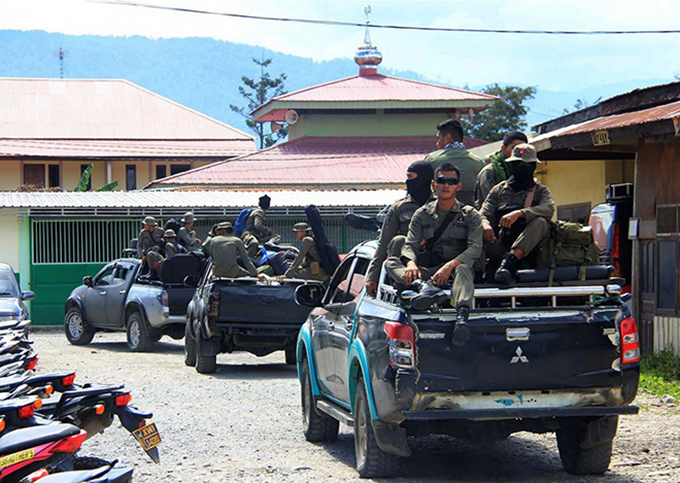
By Budi Sutrisno in Jakarta
President Joko “Jokowi” Widodo’s instruction for the military and the police to hunt down armed pro-independence rebels accused of being responsible for the 2018 Nduga massacre in Papua has led to a security crisis that has affected civilians in the region, claims the Papua Legal Aid Institute (LBH Papua).
The instruction – issued shortly after the incident in December 2018 – was directed at the Indonesian Military (TNI) commander and the National Police chief and, according to LBH Papua, had since been used as justification to launch a security operation called Operation Nemangkawi.
The group has blamed the President’s instruction for “opening” rampant armed conflicts in Nduga between Indonesian security forces and the West Papua National Liberation Army (TPNPB) after the 2018 incident until now.
READ MORE: Jokowi urged to withdraw troops from Papua’s Nduga
Due to the conflicts, large numbers of civilians – whom the group deemed “victims” of the President’s instruction – had been seeking refuge in shelters, many of whom had died due to poor living conditions there, LBH Papua director Emanuel Gobay said.
“[We] firmly urge the President to immediately evaluate his instruction […] because in practice, it has resulted in displacement and human rights violations, in particular the right to life,” Gobay said in a statement.
The President’s instruction, issued in response to the killing of dozens of workers of state-owned construction firm PT Istaka Karya by TPNPB fighters, has led to a protracted security operation in Nduga that has forced thousands of civilians to flee their homes and seek refuge.
According to Amnesty International Indonesia data, 263 Nduga residents who were displaced during the ongoing military operations had died of hunger or illness as of late January.
Instruction ‘led to regency killing’
LBH Papua also alleged that the President’s instruction led to the killing of two Papuans by TNI personnel in the regency recently.
Locals claimed the two – identified as Elias Karungu, 40, and Selu Karungu, 20 – were among displaced Papuans from three districts who had long sought refuge in the forest and were forced to head to Nduga’s capital due to hunger and illness.
On July 18, Elias and Selu Karungu were shot by military personnel as the group crossed the Keneyam River in Masonggorak village using wooden boats, the report said.
LBH Papua claimed that the deadly shootings were carried out by members of the Infantry Battalion 330/TD task force, assigned to Nduga under the Nemangkawi operation.
TNI spokesperson of the Joint Regional Defense Command (Kogabwilhan) III, Colonel Gusti Nyoman Suriastawa, confirmed that the task force was behind the shooting, saying that Elias and Selu were both members of the armed pro-independence group.
Gusti refused to comment on whether the task force’s presence in Nduga was a part of the operation as directed by the President; however, he claimed that Jokowi’s instruction was not the main guideline for the TNI’s actions in Papua.
“We must see that the reason behind the TNI’s presence there is that there is still turmoil and oppression against the people. [The President’s instruction] is not why the TNI is operating in Papua. The TNI have long been there,” Gusti told The Jakarta Post.
Stolen cell phones
He said the military were able to detect the position of the two “separatists” because they had two bags containing cell phones stolen from the TNI last month. Before crossing the river, the two were spotted receiving a revolver pistol from others, Gusti claimed.
“After crossing the river, the other residents immediately jumped into a pick-up [truck] heading for Kenyam, but the two did not. That posed a danger, so the TNI personnel shot them,” he said.
LBH Papua said the incident violated citizens’ constitutional rights and the right to life, as guaranteed in the 1999 Human Rights Law and provisions in the 1949 Geneva Convention relating to civil society in military operations.
Emanuel argued that Jokowi’s instruction following the 2018 incident was an operation to arrest, not kill, suspected pro-independence rebels.
He further urged the National Commission on Human Rights (Komnas HAM) to immediately form an investigation team to study the “alleged gross human rights violations” against the two Papuans and called for the Indonesian Red Cross (PMI) to immediately provide assistance for displaced persons in Nduga in times of conflict.
During his recent visit to Papua’s Timika, Coordinating Political, Legal and Security Affairs Minister Mahfud MD warned the TNI and police personnel not to be “provoked” into “excessive actions” and to prioritise a legal approach in handling security issues in Papua.
“I know your work is hard, but my message is to act cautiously. Don’t be provoked by other parties into taking actions that can be considered a violation of human rights,” said Mahfud said.
Budi Sutrisno is a Jakarta Post reporter.











































